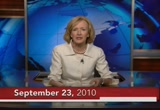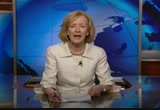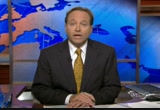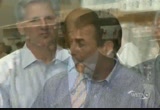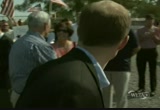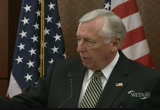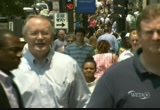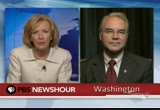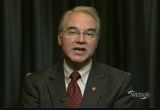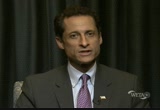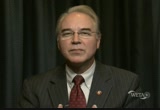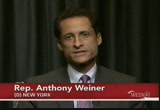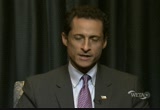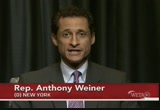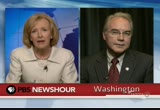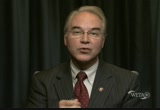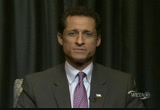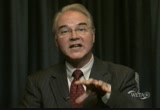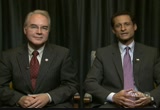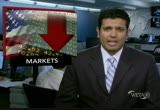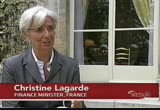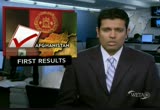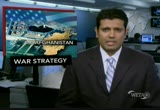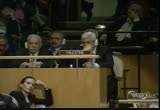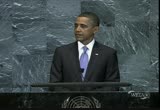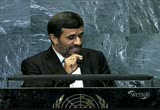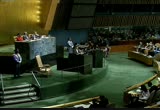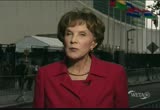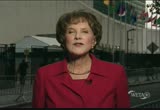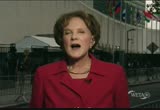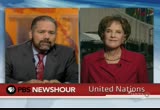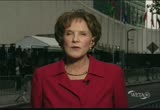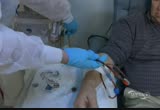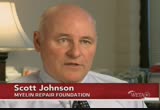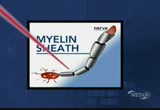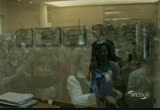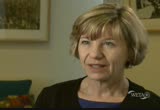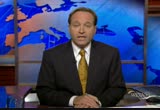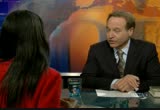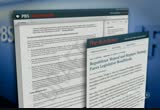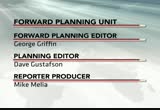tv PBS News Hour PBS September 23, 2010 7:00pm-8:00pm EDT
7:00 pm
>> woodruff: good evening. i'm judy woodruff. republican leaders in washington unveiled their 2010 campaign platform today promising to repeal the new health care law and un-do democratic policies across the board. >> brown: and i'm jeffrey brown. on the "newshour" tonight, kwame holman has details of the g.o.p. plan. then, democratic congressman anthony weiner and republican david price debate whether it's a return to failed economic policies or a blueprint for a better future. >> woodruff: ray suarez talks to margaret warner about president obama's visit to the united nations and the reaction there to his diplomatic initiatives. >> brown: special correspondent dave iverson reports on a new push to get scientists to work together in the pursuit of medical cures. >> let's put our arms together and brains together and solve the problem collectively and for a project like this you absolutely need that to succeed. >> woodruff: and isabel wilkerson discusses her new book on the great migration of african americans. that's all ahead on tonight's
7:01 pm
"newshour." major funding for the pbs newshour has been provided by: >> i want to know what the universe... >> looks like. >> feels like. >> from deep space. >> to a microbe. >> i can contribute to the world by pursuing my passion for science. >> it really is the key to the future. >> i want to design... >> a better solar cell. >> i want to know what's really possible. >> i want to be the first to cure cancer. >> people don't really understand why things work. >> i want to be that person that finds out why.
7:02 pm
>> innovative young minds taking on tomorrow's toughest challenges. and by the alfred p. sloan foundation. supporting science, technology, and improved economic performance and financial literacy in the 21st century. and with the ongoing support of these institutions and foundations. and... this program was made possible by the corporation for public broadcasting. and by contributions to your pbs station from viewers like you. thank you. >> brown: congressional republicans went public with their "pledge to america" today.
7:03 pm
it's their policy goals if they win control of the house in the november elections. "newshour" correspondent kwame holman begins our coverage. >> reporter: it was a far cry from 1994's "contract with america," and the grand signing ceremony on the steps of the u.s. capitol. today, house republican leaders appeared in shirt sleeves at a hardware and lumber store in suburban virginia 30 miles from capitol hill with this year's policy prescriptions. minority leader john boehner and his top lieutenants spelled out their central point. >> government is out of control in washington, and we need to rein it in, and begin a new drive for a smaller, less costly and more accountable government in our nation's capital. these are the things that the american people are demanding, >> reporter: while the backdrop has changed, republicans hope their document, called "a pledge to america," will produce similar results to 1994. that year's plan helped the party gain 54 seats and take the house majority for the first
7:04 pm
time in 40 years. one of the main architects of the 2010 version is california's kevin mccarthy. he accused democrats of ignoring the country's wishes. >> from the billion dollar bailouts to the stimulus package that failed to stimulate, to the government takeover of health care, you cried stop. but the democratic majority in washington has refused to listen. we are here to tell you today that we have been listening, and we've heard you. >> reporter: in response, the house republicans said they will permanently extend all the income tax cuts passed under president bush, not just those for the middle class as president obama wants. they also would give small businesses a tax deduction equal to 20% of their income and seek to repeal and replace the health care reform law enacted by democrats this year. and, they vowed to reduce government spending to pre- stimulus, pre-bailout levels. indiana's mike pence-- the number three house republican--
7:05 pm
said that list shows his side is tuned to the nation's mood. >> well our hope is that as people look at the pledge to america is that they come to the conclusion that house republicans get it. that after a year of listening to the american people, at town hall meetings, online, through the mail, through email, that the ideas that we've presented here, are ideas that this congress should take up right now. >> reporter: the pledge offered few details of how to cut spending and on social security and medicare, it called simply for making the necessary decisions to protect entitlement programs. >> i don't have all of the solutions, but i believe if we work with the american people, the american people will want to work with us to come to grips with these challenges that face our country. >> reporter: back at the capitol, reaction from democrats was swift and critical. house majority leader steny hoyer. >> pledges are easy to make, but the american voter needs to look at performance.
7:06 pm
who left a $5.6 trillion surplus for the last administration that was then squandered by two wars, two tax cuts and a drug prescription bill which we like but all of which was unpaid for? all of which was unpaid for. so i say to my friends on the other side talk is cheap. >> reporter: hoyer's fellow marylander-- chris van hollen-- is in charge of the mid-term campaign for house democrats. he called the republican plan just "more of the same." >> what they've done is taken eight years of bush administration policies and recycled them and repackaged them and they're trying to sell it as something different when if you look very carefully at the key provisions, it's those failed policies all over again. >> reporter: republican leaders dismissed the democratic darts. they said the pledge is aimed at discontented voters of all stripes, especially independents. and, a pew poll released today
7:07 pm
found independents who favor smaller government support republican candidates by more than two-to-one. other polls have found the public disapproves of both parties, something republican leader boehner acknowledged. >> listen, when republicans were in charge of congress we made our fair share of mistakes. i think we've demonstrated over the last 20 months that republicans have heard the american people. >> reporter: the party leaders now hope that taking the pledge will give voters something concrete. as one said today: "we've put things on a sheet of paper." >> woodruff: now, two different reactions to the republican plan from two members of the u.s. house of representatives. georgia republican tom price, chairman of the republican study committee and democrat anthony weiner of new york. gentlemen, thank you both for talking with us. >> thanks, judy. >> woodruff: congressman price, let me begin with you. one of the main elements in this proposal is to stop what you call out-of-control government spending. tell us just what a few of the
7:08 pm
main programs are that you want to see eliminated and how much money would that safe save? >> well, this work product is really the result of listening to the american people and what we've heard all across the land is that people believe washington is spending too much money and has been for a long period of time for both democrat and republican administrations. we agree. we believe that we ought to be able to get back to pre-bailout and pre-stimulus levels immediately and then work on decreasing federal spending beyond that from that point. the important thing that the american people have said is that you can't continue to spend more money than you take in. so what this proposal says is that we will get on a path to balanced budget which we aren't currently. >> woodruff: what programs would be endd? >> that's exactly the problem we go through here in congress and hopefully with a president who wants to work productively with the congress to find those things that are either duplicative or redundant or ought not to be a priority of the frosm. the fact is, over the last two fiscal years we have been spending $1.4 trillion than we
7:09 pm
take in and the american people have said stop the madness. we've been listening, we hear them and that's what we've put on paper today. >> woodruff: congressman weiner, that is what many americans are saying as we get close to the election. >> there's no doubt about it. i think congressman price and i want to eliminate waste in government. but if you read through the documents and look at the book, for example, they put out last month from their leadership, including the leader of the budget committee for them, they want to privatize social security, do away with medicare the way we know it. they have these bursts of honesty and that to their credit was one of them. we have a philosophical difference here. they believe one of the ways to save money for the government is to let health insurance companies run wild and do whatever they want. they believe that, frankly, medicare ands is, these so-called government programs run amuck. but for a lot of people they're the safety catch that they have in this tough economy. we're going to fight tooth and nail to stop the privatization of social security and ask them directly. did they support what cantor, their whip, but whyian, the head
7:10 pm
of their budget committee, says they're going to do? there's no doubt about it things will be different if the republicans take over, but much to the worse for the american people. >> woodruff: congressman price, let's zero in on some of these so-called entitlement programs like social security and medicare. what do republicans want to do? because you do hear some of your republican colleagues talk about moving to a more private system. >> well, judy, as you well know and as my friend anthony knows, all of these programs are on a course, a fiscal course, that will not allow them to survive. so they have to be reformed. and what we believe is that we ought to be working together positively to reform the programs so that we, in fact, preserve social security. preserve medicare in a way that makes sense for patients, not just for government but for patients. as a physician, having practiced for over 20 years, i know that the medicare system is resulting in some decrease in both quality and access to care for patients right now. and the bill that was passed into law earlier this year will, in fact, further decrease the ability of seniors to gain the kind of access to coverage and
7:11 pm
care that they desire. that's not what we believe ought to be done. we believe we ought to save these programs, reform these programs in a positive way that makes sense for people not for bureaucratses. >> woodruff: can you give us an example of how they should be reformd? >> sure. the whole issue in terms of medicare is whether or not individuals are going to be able to select the physician they want for themselves instead of having the government select them for them. we put a positive alternative on the table. it wasn't attended to by the other party at all. h.r. 3400 that would get folks covered, that would solve the insurance challenges, that would make sure clinical decisions, medical decisions, are made between patients and families and doctors and would address the lawsuit abuse issues that weren't attended to at all in the previous bill. those are the kind of positive reforms that we ought to be putting in place. and you'll notice, judy, none of them require putting the government in charge. >> woodruff: congressman weiner, would that bring the kind of savings that the republicans say is their priority? >> well, this is the perfect day to ask that question. one of the things in their new
7:12 pm
contract on america is that they're going to repeal the health care bill. it's funny they say that today. today is the day that diagnostic services become without copayments for americans. they can't be kicked off their health plan for preexisting conditions. seniors started and a million seniors have already gotten help filling the doughnut hole for prescription drugs and we extended the life of medicare for ten years. they say they want to eliminate all of those things. they say it right there today on the day that a lot of these services go into place. you know, for a lot of americans, they don't believe their congress should be standing up fighting for the insurance industry. they want them fighting for the american people. and there really are differences here. people may think "who cares who runs congress?" let's look at the facts. they say they're going to repeal a health care bill that is providing all these additional services. yesterday it came out that seniors on medicare advantage are going to see rates go down for the first time because of this bill. they want to repeal that. why? because the republican party fundamentally is behold on the the insurance industry. the democratic party is trying to say we want to try to reel in
7:13 pm
the worst abuses. so when you hear them say they want to privatize social security, go to a private voucher system for medicare, repeel the health care bill, you've got to ask yourself, whose side are they on because that's not where the american people are. >> judy, it's a great line but nobody's saying that on our side of the aisle. the fact is we believe that clinical decisions-- if we stick to health care-- ought to be between patients and families and doctors and that's not what the bill allows. in fact, what the bill does is creeds the definition of quality, that is the kind of care you'll be able to receive and every american will be able to receive from patients and families and doctors and moves it to washington, d.c. that's why the american people are so upset with what's going on. because they see this further encroachment of the federal government into their lives in every single aspect, whether it's financial, whether it's health wise, whether it's from the jobs that they're able to get or where they're able to send their kids to school. and they object and say stop the madness. >> woodruff: i want to ask congressman weiner, you were shaking your those comment on that. >> as a matter of fact it's not true. ask anyone over 65 whether when they visit their doctor the
7:14 pm
doctor isn't able to give them a prescription or tell them what they need. and by the way, they say mo one's talking about privatizing social security? mr. mccarthy who you quoted earlier, mr. cantor, mr. ryan wrote a book about that's their plan. they're proud of it. i have to give the republicans credit on this point. they are finally showing what they want to do with social security. if you believe it's smart to risk social security trust fund in the stock market, you probably should vote for the republicans. but we think it's a very bad idea. this is a philosophical question. if you do want to go back to the bush years, if you do want to go back to those policies and you do want to go back to health care running out of control, health insurance companies dominating, that same play that bush had about privatizing social security, this is the party. the republicans have something for you. if you want to keep moving forward, not as fast as we'd like, if you want to implement things and improve them as we go, that's what democrats are arguing. >> woodruff: congressman price, isn't there some contradiction in what the republicans are saying? you say you want to repeal the entire obama health care reform plan, but you say you will in the future reinstate some
7:15 pm
aspects of it that right now are already taking effect. like making sure that children are covered who have preexisting conditions. making sure that coverage is extended to children up to the age of 26. what's the point of taking these things away if you're going to try to put them back? >> because the program that has been put in place dictates to those 26-year-olds and to those families what kind of health coverage they will have. it defines very specifically what will be in that benefits package. so that it will determine whether or not you can get the wonderful diagnostic test that anthony talked about. but then you've got politicians deciding what tests ought to be done on a patient, not patients and families and doctors. it's a significant difference. and when you talk to clinicians, when you talk to the people who are truly taking care of patients across this land, what they say is, yes, we want people covered, absolutely. we want people covered on the republican side of the aisle as well. but what we want them to be able to have coverage for is the kind of health care that they desire, no that the the government desires for them. when you put the government in charge of defining what quality
7:16 pm
is in health care and what is available in a benefits package, we've gone down the wrong road and the american people know it. >> woodruff: congressman weiner, respond to that specific point about whether it's the government making these decisions because that's the part of the republican mantra in this program. >> it certainly is. and like so much of the discussion about health care, it's simply not true. perhaps mr. price is referring to the fact that when the new exchange is set up there's going to be minimum standards for health insurance companies. i don't think anybody can object to minimum standards. the diagnostic care starting today without copayment, those are services that doctors are prescribing. mammographies for women that save lives. diagnostic care for blood pressure. for senior citizens it means getting help with the doughnut hole, the gap in the coverage for prescription drugs. they're getting that right now. i understand there must be a very good talking point poll saying government getting involved. i asked senior citizens to go to their doctor and ask them is anyone stopping you for prescribing something for me? if you're a family struggling and your child just got out of college and has a low-paying job
7:17 pm
that can't get health insurance, today they're required to be covered by insurance companies. and by the way, if you think the insurance companies are doing those things voluntarily by the graces they have, you've got another thing coming. we don't trust the insurance companies to do the right thing, we want to make sure we fight for the american people. >> woodruff: very quickly, congressman price, i have to ask you about the plan to keep the bush tax cuts going. so much of what republicans say is important to them is to get the deficit down, to get spending down. and yet you know there's an enormous price tag to these tax cuts. how do you reconcile that? >> well, we don't believe that in a time of economic challenge we ought to be increasing taxes on any american at all. and we also believe that when you keep taxes low and bring taxes low what you actually do-- it's counterintuitive-- is increase the revenue to the federal governmentment it's happened every time it's been done, whether it was under president kennedy, president reagan or president bush. and what this... what the other side refuses to recognize is that the law of economics, if you tax something more, if you punish people by taxes, you'll get less of it.
7:18 pm
and they want to tax the job creators across this great nation and that decreases the ability of those job creators to be able to create jobs. and further depress our economy. so what we ought to be doing is decreasing taxes on the american people, not increasing taxes. we support decreasing, they support increasing. >> woodruff: congressman weiner, this is a point on which democrats yourselves are divided. >> it certainly. is i think every member of the democratic party believes we should give additional tax relief to the middle-class. how you define that and whether maybe to let all of the taxes continue. but it's interesting to note, why is it that the bush tax cuts are expiring this year? because it was a gimmick when the republicans were in charge to pretend they're beings fiscally responsible when they're not. no doubt about it you can make a good argument maybe this is the time to deficit spend. but this tax... providing tax relief for billionaires-- you heard right-- under their plan a billionaire would get a tax cut, maybe that's a good idea. i'd wrath give it to the middle klass, i'd rather give it to the social security cola senior citizens should get. it's funny, the republicans only
7:19 pm
seem to care about deficits when there's a democratic president in charge. when bush was here and mr. price was here, they ran up deficits like drunken sailors and i didn't hear them complain. >> judy it's a great line, it just doesn't work. >> woodruff: we could go on all night and we would love to do it. but the clock is ticking and we hope to talk to both of you again very soon. congressman tom price, congressman anthony weiner. >> no offense to drunken sailors. >> brown: still to come on the "newshour": world leaders at the united nations; turning research into real-world treatments for disease and the great migration of black americans from the south. but first, the other news of the day. here's hari sreenivasan in our newsroom. >> sreenivasan: a long-delayed bill designed to help small business is on its way to president obama. the house approved the measure today. it establishes a $30 billion fund to help community banks lend to small businesses. it also cuts taxes by $12 billion over ten years. most republicans opposed the loan fund, saying it was another
7:20 pm
bailout that won't work. wall street had a down day, after news that first-time claims for unemployment benefits went up last week. the dow jones industrial average lost nearly 77 points to close at 10,662. the nasdaq fell seven points to close at 2,327. the food and drug administration announced new limits on the diabetes drug avandia. it has been linked to increased risk of heart attack. the drug will now be limited to new patients who cannot control their blood sugar with other medicines. the move came as europe's drug regulating agency ordered avandia off the market there. across france today, nearly one million people protested, on a day of nationwide strikes. their target: plans by french president nicolas sarkozy to raise the retirement age from 60 to 62. we have a report from lindsey hilsum of "independent television news." >> reporter: the socialists and the occasional anarchists were out on the streets of paris today fighting for right to a
7:21 pm
comfortable old age and a state pension at 60. whatever the mood of austerity across the rest of europe, france, they say, is different. tell me why french people should retire earlier than everybody else in europe? >> because we are french and we are the best you know? french revolution, you know? human rights, you know? >> maybe because we are like in advance about social progress . >> reporter: less than 10% of the french work force is unionized, mainly in the public sector, but they can still make a lot of noise. this round of strikes and demonstrations has won concessions for women who had children and manual labors. but president sarkozy says he won't back down on the central issue-- retirement at 62. the finance minister is certain ly not returning. >> president sarkozy was elected to reform the country. >> reporter: and now the french don't like it.
7:22 pm
>> well, but he's a very determined and very resilient president. he was elected to do that, the people of france wanted the country to be more modern, to be more balanced, to be better financed and all of that takes strength, determination, and sometime s impopularity. but that's the price to be paid. >> reporter: today, half the flights from paris were canceled and half the trains across the country didn't run. france's economy isn't recovering from recession as quickly as germany's. a short rest over a glass of wine. the demonstrators say they'll be out again next month and are hoping other europeans will follow suit. >> sreenivasan: the plan to raise the retirement age has passed the lower house of the french parliament. it still faces debate in the senate before becoming law. in afghanistan, officials released the first wave of partial results from last weekend's parliamentary elections. they came from a single province. final, nationwide results are not expected before the end of
7:23 pm
october at the earliest. that is partly because of a probe into hundreds of allegations of fraud. defense secretary robert gates insisted today he is confident in the u.s. war strategy in afghanistan. at a pentagon briefing, gates offered his first reaction to a new bob woodward book, "obama's wars." it depicts a deeply divided presidential team, and suggests the war plan was driven more by politics than by military considerations. gates said today he has not read the book, but he made several points. >> the first is conflict sells. the second, the relationship among senior officials in this administration is as harmonious as any i've experienced in my time in government. and the third is-- i believe this very strongly-- presidents are always well-served when there is a vigorous and spirited debate over important issues. >> sreenivasan: the secretary said he would not sign troop deployment orders if he had any
7:24 pm
reservations about the afghan mission. british police have arrested six men for posting an online video that appears to show them burning two korans. two of the men were arrested last week on suspicion of fomenting racial hate and the others were brought in yesterday. the burning took place on september 11. a minister in florida said he would burn a koran that same day, but he backed down, after appeals from top u.s. officials. virginia is set to execute a woman tonight, for the first time in nearly a century. teresa lewis faced death by lethal injection for the hired killings of her husband and stepson in 2002. supporters argued the 41-year- old grandmother lacked the mental capacity to orchestrate the crimes. the founder of facebook mark zuckerberg will donate $100 million to the public schools in newark, new jersey. the system has been troubled for years by poor results and rampant mismanagement. zuckerberg will make his announcement tomorrow on the oprah winfrey show. it coincides with release of a new movie "the social network" which suggests he stole the idea
7:25 pm
for his business from friends. those are some of the day's major stories. now, back to jeff. >> brown: president obama joined other world leaders today at the u.n. general assembly and continued his push for middle east peace. ray suarez has the story. >> suarez: the israeli- palestinian conflict was the focus of the president's remarks before the united nations general assembly today. mr. obama urged the leaders of 192 member states to support the peace process, just weeks after his administration brought the israelis and palestinians together for direct negotiations. >> if an agreement is not reached, palestinians will never know the pride and dignity that comes with their own state. israelis will never know the certainty and security that comes with sovereign and stable neighbors who are committed to co-existence. the hard realities of demography will take hold.
7:26 pm
more blood will be shed. >> suarez: palestinian authority president mahmoud abbas listened to president obama's remarks, but israel's seats sat empty in observance of a jewish holiday. days from now, the slowdown on new construction of jewish settlements in the west bank is set to expire. the israeli government says it has no intention of extending the temporary freeze. and the palestinians have threatened to leave the peace talks as a result. today, president obama said extending the moratorium was essential. >> now is the time to build the trust and provide the time for substantial progress to be made. now is the time for this opportunity to be seized, so >> suarez: he also urged arab states to help palestine going forward.
7:27 pm
>> many in this hall count themselves as friends of the palestinians. but these pledges must now be supported by deeds. those who have signed on to the arab peace initiative should seize this opportunity to make it real by taking tangible steps toward the normalization that it promises israel. >> suarez: on iran, the president renewed an offer to negotiate with the clerical regime on its nuclear program. the u.n. security council imposed new sanctions on iran in june. >> the united states and the international community seek a resolution to our differences with iran, and the door remains open to diplomacy should iran choose to walk through it. but the iranian government must demonstrate a clear and credible commitment, and confirm to the world the peaceful intent of its nuclear program. >> reporter: later this afternoon, president ahmadinejad but the real turning point of president ahmadinejad's address
7:28 pm
came when he accused the u.s. government of being responsible for the 9/11 attacks. >> (translated): at some segments within the u.s. government orchestrated the attack to reverse the declining american economy and its grips on the middle east in order to save the zionist regime. the majority of the american people as well as most nations and politicians around the world agree with this view. >> suarez: the u.s. delegation to the united nations left in protest and were joined by several european delegations. >> (translated): iran has already been ready far dialogue based on respecting justice. secondly, those who have used intimidation and sanctions in response to the clear logic of the iranian nation are in real terms destroying the remaining credibility of the security
7:29 pm
council. the leaders of iran and the u.s. did not meet face to face but president obama did sit down with china's premier wen jiabao. their talks were described as candid, a diplomatic word meaning they voiced differences. the president said cooperation between the two countries was absolutely critical in easing global financial problems. mr. obama's three-day trip to new york will also include private meetings with a number of other world leade. he greeted others at a luncheon this afternoon. margaret warner is in new york and she joins me now. margaret, were you struck by how much of the president's address had to do with the middle east? >> i was, ray. it was nearly a third of the speech if you count the minutes. the white house just decided that this was the one issue on which they really need right now help from the international community. last year it was iran, nuclear nonproliferation. of all the list of issues president obama told the u.n.
7:30 pm
last year he wanted to address that very little progress has been made on, it's the middle east. now, as you know, the parties are in the talks but it's very fragile. you have this looming deadline of the moratorium expiring on sunday. and so his message to this body was essentially we come back here year after year and talk about the middle east and isn't it terrible what's going on there, well, many of you call yourselves friends of the palestinians, now's the time to show it. and he is, of course, speaking to the arab states and what he's saying to them is you have to help create the political space and support for mahmoud abbas so if netanyahu lets the moratorium expire, abbas stays in the talk and more broadly to continue to give abbas moral support, political support and more financial support. he's also saying to them stop tearing down israel in public forums. in fact, you ought to be sending israel positive signals about what a deal could mean for them
7:31 pm
in terms of relations with the arab world. so really the message was it's put up or shut up and they just decided that this was the forum. it's not a new message. but they decided this was the forum and the moment to do it. >> suarez: the american president sounded like he was still looking for a compromise over iran's nuclear enrichment, but it didn't sound like the iranian president was very interested. : no, ray. you know, the big headlines today about... that the u.s. and this pricks 5 plus one group was exploring the prospect of renewed talks with iran, there have been some positive signals, ahmadinejad has been flashing around town talking about renewing talks but there's also been some negative signals. the fact is that they're continuing to enrich, as we know, and they're obstructing inspectors. so on the one hand, they had this meeting yesterday, this p 5 plus one, the permanent members of the security council plus germany, and they did talk about
7:32 pm
the strategy for negotiations if they should start again. on the other hand, they can't seem to get through to the main negotiator and they don't know whether ahmadinejad, one, is serious and, two, even has the authority to revive the talks. the white house then reacted to what ahmadinejad had to say today by saying, you know, these words... these latest words reflect why the burden is on them, why we have so little confidence in tehran and why the burden is on them to demonstrate their true intentions. and by that, the white house means... or the obama administration means it's not just enough for ahmadinejad to talk about wanting to return to talks, he has... the regime there has to make an effort and actually return to the structure that has been set up and, as i said, they have no idea given the turmoil that's going nontehran whether's that's at all in the cards. >> suarez: the united states has a lot of pending issues with china.
7:33 pm
two leaders met today. any inkling of progress? >> ray, the interesting thing, we just had a briefing on the china meeting and... with the premier, wen. and the two hours, 90 minutes was taken up by the currency dispute, the dispute over the valuation of china's currency. president obama, we're told, went into the meeting and said this is the number one issue for me in this meeting. he went on to say we were very heartened by... in june when you said you were going to have a more flexible currency policy but we've been disappointed since then. and we expect to see an accelerated pace of revaluation of the ewan and... yuan and hay discussed both its economics and political aspects. the context of this is you've got now a groundswell on capitol hill for a tough currency bill, which i think is going to come before house ways and means tomorrow. so the briefer who told us about the meeting described the talks
7:34 pm
as candid and, as we know, that's diplomatic speak for very, very blunt talk. >> suarez: margaret, what's coming up tomorrow? >> well, for the president, ray, the diciest issue tomorrow concerns sudan. there's a special summit that's being convened to talk about this looming referendum in january in south sudan about whether it's going to vote for independence from sudan. washington is very worried that president bashir of sudan is going to frustrate this vote in some way and you can see an outbreak of civil war. and so what they want to do with this meeting to rm is on the one hand put the spotlight, tell the sudanese the world's watching and on the other hand make clear to the sudanese that if they were to fulfill their obligations to have this referendum pro sneed a peaceful and competent way that there could be some benefits in the way of better ties with washington. >> suarez: margaret warner at the opening of the u.n. general assembly. thanks, margaret. >> thanks, ray.
7:35 pm
>> woodruff: now, new developments in the field of biomedical research. special correspondent dave iverson was diagnosed with parkinson's disease in 2004 and has been reporting on the search for effective treatments for that disease and others. he filed this report for our health unit-- a partnership with the robert wood johnson foundation. >> reporter: scott johnson has had multiple sclerosis for 34 years. he's coped with everyday challenges like how to drive a car. it's impacted you know virtually all of my adult life. you know my right hand doesn't really work very well, or really at all. my right leg doesn't work great. >> reporter: david anderson's challenges are different. his transplanted kidney failed
7:36 pm
three years ago and he depends on dialysis in order to survive. >> when i need dialysis, mostly i notice that i feel sort of muddy in my thinking. you know the toxins in your blood are not just in your muscles, they're all over your body including in your brain. >> reporter: david anderson and scott johnson contend with very different conditions, but they share a similar frustration-- the slow pace of medical advancements. so why hasn't more progress been made in solving a variety of complex diseases? after all, the national institutes of health spend over $30 billion a year on research. indeed, the problem may not be how much we spend on medical research, but the medical research system itself and a problem often referred to as the valley of death. >> reporter: a problem that frustrates patient advocates like scott johnson.
7:37 pm
>> the valley of death is a gap in the overall process. at the front end, you've got academics who are doing basic science research. and the result of that is about 800,000 papers published a year. that's a lot of papers. and at the other end of the spectrum you've got big pharmaceuticals and biotech that actually has to turn this into medicine. >> reporter: to bridge the gap johnson says requires scientific grunt work that often doesn't get done. >> you need to replicate experiments many times and that just doesn't get funding. that doesn't interest academics, it doesn't help their career. you don't get grants so it just doesn't happen. and at the other end of the spectrum you say why doesn't big pharma do it? well because how do you wade through 800,000 papers and say what is the gem to do all these
7:38 pm
steps. >> reporter: so nine years ago johnson decided to leave his career as a silicon valley executive to start a foundation aimed at speeding the research process and finding a new treatment for m.s. he immersed himself in the world of science. johnson got to know dr. ben barres who as chair the neurobiology department at stanford university school of medicine was knee deep in the world of academic research. >> we work very hard for a few years and then we publish a paper in a good journal and i always assumed that that discovery if it were immediately relevant to a new treatment would be picked up by one of the big drug companies and then develop the next step. and so i thought i was doing my part. >> reporter: like most m.s. researchers, barres had focused on intriguing scientific questions, but not necessarily
7:39 pm
on what might help patients most. in m.s., the body's immune system attacks something called myelin, which sheathes the nerves. without it, the brain can't tell the muscles what to do. to date most research had focused on why myelin goes missing but not on the practical question of how repair it. then scott johnson came along. >> and he sort of embarrassed everyone from coast to coast into saying we've got be working more on this question. >> reporter: johnson has raised $43 million for research, including much of the work barres is now engaged in. but the funding deliberately comes with strings attached: the research must be patient centered, scientists must work collaboratively and importantly provide the kind of data that would persuade drug companies to take the next step. >> i'm dr. susan desmond hellman, the new chancellor. >> reporter: the new chancellor at university of california at san francisco knows something
7:40 pm
about getting private industry to move forward on treatments dr. susan desmond hellman came to her new position at u.c.s.f. fresh from genentech, where she oversaw the development of breakthrough cancer drugs like herceptin. but desmond-hellmann thinks private industry has become less willing to make those investments. >> there is concern today that that kind of innovation, that kind of basic science and following it with great translation and clinical science is rare. >> reporter: so to re-ignite innovation, desmond-hellmann believes academic scientists now have to take on the collaborative approach she once witnessed at genentec. >> the experience i had in private industry i always worked as a member of a team. and that was great fun. i couldn't be and wouldn't be the expert in all things. but in the end something good happens and i was rewarded for that good outcome not whether i published. >> and is that something you're trying to inculcate here at u.c.s.f.?
7:41 pm
that more collaborative interdisciplinary approach? >> absolutely. >> reporter: and that collaborative principle is gaining adherents. at the san francisco veterans administration, an alzheimer's brain imaging project uses a novel data sharing approach. the project draws on funding from government, industry and academia. it's led by dr. michael weiner of u.c.s.f. and the v.a. >> when any scientific project is done, a scientist collects the data and keeps it in their laboratory and then writes a paper about the data. the raw data is not released, just a paper which is a description of the raw data. >> reporter: but this time, scientists did the opposite. >> we decided for a number of reasons to share all the data that we collect from this study and share it widely on the internet and the results of that have just been amazing. >> reporter: the alzheimers' study followed 800 patients at 50 different centers. the researchers all had instant access to the same data and
7:42 pm
worked collaboratively to figure out a way to detect alzheimers early on, a potentially significant breakthrough. >> what's extremely interesting is that were seeing signs in the is that we're seeing signs in the completely normal people that they have biomarker signatures for alzheimers disease. >> reporter: so in a way, is this like having real time, open source research? yes, yes, that's exactly what it is, real time open source research. >> reporter: and its research that's both collaborative and patient focused, which chancellor desmond hellmann says has to be the primary academic goal. >> increasingly what people call translational science, or i would call clinical science or human biology is allowing us to say that science question you just asked and answered, first of all, is that relevant to human beings and secondly what about the patients? >> reporter: which takes us back to david anderson, the kidney disease patient we met at the beginning of this story.
7:43 pm
right now, he faces the prospect of being hooked up to a machine three days a week for the rest of life, but a new development has changed those prospects. >> the information i got recently about the possibility of creating an artificial, an implantable kidney-- well that's something worth hanging around for. >> so what we have here is a little model of our device. >> reporter: an artificial kidney is in the works at the laboratory of dr. shuvo roy. >> and this would actually be implanted and would roughly be this size but lighter? >> this may look big to us but actually to give you some context it would fit within the abdomen of most of us. >> reporter: dr. roy is an engineer by training, but the project brought together cell biologists, material scientists, engineers and practicing physicians. >> by finding these right people together i think we can sort of
7:44 pm
take out these traditional ways of doing academic research in silos, but saying lets put our arms together and brains together and solve the problem collectively and for a project like this you absolutely need that to succeed. >> reporter: it's the same collaborative approach that scott johnson's myelin repair foundation is promoting teams of scientists working collaboratively to achieve common goal changing the model for how research works and solving the problem of multiple sclerosis that's challenged him for 34 years. >> and to be able to prevent others from going through that is something i'd like to do. but probably on a larger scale it's really about this model because i think that this model can be applied to any disease research. >> reporter: and of course there's no shortage of diseases still to tackle. >> brown: finally tonight: "the great migration." from 1915 to 1970, some six million african-americans fled
7:45 pm
the south for points north and west in search of a better life. that exodus changed the country in myriad ways that are very much still with us and is the focus of a new book: "the warmth of other suns." by isabel wilkerson, a pulitzer- prize winning journalist and now professor at boston university. i talked with her earlier this week. welcome to you. >> thank you for having me. >> jeff: now, you refer to this migration as "perhaps the biggest underreported story of the 20th century." what was missed? what made this an important story that you wanted to tell? >> the voices of the people who had migrated was probably the biggest part that was missing in this great story. it's a classic american story of longing and determination of people who wanted something better for themselves and for their children and this was essentially a defection from the south, from the jim crow south, that occurred within the borders of our own country. not unlike the people who left the... left europe in steernlg across the atlantic wanting
7:46 pm
something better for their own children. >> jeff: those voices, you went to find those voices. many of them are gone. >> yes. i worked with great urgency. a lot of the people... began in 1915, ended in 190, you're talking about multiple generations of people who participated in this and time was running out. i had to get the stories if them before it was too late. >> couric: >> jeff: you interviewed some 1200 or more people. >> i stopped counting after that. >> jeff: you stopped counting. then you chose three to represent the total experience. why that approach? >> why did you do that? >> well, i needed three people to represent the three different streams of the migration. one was up the east coast from georgia, the carolinas and virginia up to washington, to new york, to philadelphia. then i needed one who'd represent the midwest migration from mississippi, alabama, and arkansas to chicago, detroit, cleveland. and then finally that third stream from louisiana and texas to california. so i needed three people to
7:47 pm
represent each of those streams. i also needed to have three people who would represent the three different decades of the migration. so it would be three different people, three different decades, three different starting points, and three different destinations to represent the breadth and the scope of this great migration. >> jeff: when you talk to people, what struck you about... you started by talking about the reasons that people left the jim crow south. and i was struck by the dailiness of the way people were affected by the laws written and unwritten around them. >> the facts of their life were that almost everything that they did there was a reminder of a cast e system that kept each race firmlin place and their con scribed differences. and so what you had was places where, for example, it was against the law to... for blacks and whites to play checkers together in birmingham. someone actually sat down and wrote that as a law. there was even a black bible and
7:48 pm
a white bible in many courtrooms in the south to swear to tell the truth on. >> jeff: a black bible and a white bible. >> yes. >> jeff: so it wasn't just at a legal and global level, it was just really in their daily lives. >> in their daily lives there were reminders. >> jeff: now, there are far... there are incredible stories here. one i want to ask you about because it struck me so much, this sort of unforgettable story of the man driving to california. that's robert foster. >> yes. >> jeff: his drive from louisiana to california. he's a doctor. he was seeking a way to practice and to be... have a respectable life. he got out of the jim crow south driving. >> as he thought. he thought he had. >> jeff: as he thought. but he still couldn't get a motel to give him a room on his way. >> so he unexpectedly had to drive through multiple states of the west just to get to california without rest, without sleep, without any place to gather himself.
7:49 pm
and in ding so, he had to make this... he had that this realization that perhaps he made a mistake. he wondered if he'd made a mistake and he wondered about all the people who might have migrated or immigrate from anywhere else in doing the right thing. i attempted to replicate that migration. i rented a buick as he had and drove across the country from louisiana to california and i could only make it to yuma, arizona, before having to stop. >> jeff: to see what it would be like to not be able to stop, to feel like you couldn't stop? >> yes, i wanted to feel what happens to the body and the fingers that have been gripping the wheel for so long, your eyes getting so heavy they begin to ache. i wanted to experience that. i had my parents with me who also were a part of this great migration. in fact, the vast majority of african americans you meet in the north and the west are descendd from people from the great migration. they owe their very existence, essentially, to people who had migrated from the north to the south.
7:50 pm
so i... so i had my parents with me and at a certain point when we were... i was ready to veer from the road and almost falling a i sleep at the wheel, they said "for all of our sakes, let's stop." and it was no longer 1953 so we were able to stop and find a place. >> jeff: this goes to what i want to ask you about because a very interesting thing here is how you chose to write this. there are personal aspects to this and occasionally you'll refer to something with your own parents or your own family. there are elements of oral history, there are elements of traditional history writing. and, of course, there's the reportage that you've done. but you've mixed them all together. what... why? what do you feel like you were doing and telling this? >> what i wanted to do was tell the comprehensive story of what it was like to be living in the south at the time that this migration began. which would give us an indication of why they might have left. there are six million different reasons why they left.
7:51 pm
different precipitating events that would have caused an individual to leave. that was one thing. the other thing was i wanted to be able to have people picture themselves in it. picture themselves in those circumstances and to try to think what might i have done. also think back to their own ancestors. what might their ancestors in our own lives, our own forebearers, someone in all of our lives did this regardless of our background and ethnicity so i wanted to put people inside of that life and that heart, the immigrant heart. and in doing so, i needed to have lots of information. and i needed to listen to lots and lots of stories, narrow it down to these three protagonists who the reader can follow and that's why i made the decision. >> jeff: one of the characters, ida may gladney she tells you her first glimpse of chicago "looked like heaven." as she and so many others tell you, it was not a promised land of happiness and opportunity in many cases. just before we finish here, what did you find?
7:52 pm
what struck you about what they found? and what issues are still with us now? >> well, what struck me about what they found is that they found that actually a lot of the same assumptions about them that had occurred and been existing in the south followed them where they went. so they had many, many barriers to moving up. they also had heart break where there were. .. had difficulty breaking into certain fields because they were not permited into unions and so many different ways they were still held back. but i think the overall assessment of this migration has to be looked at from the perspective of what was it they were seeking. they ultimately were seeking to be able to be free. to be able to have better education for their children and that's one thing they could assure themselves of by just leaving because they left a system that was segregated, they could only go to the eighth grade some of them. by just going to the north their children were going to get a better education. what their children made of it is another story but at least they had the opportunity. and also, their goals were modest. they weren't looking to run cooperations or to own mansions, they were looking to be able to
7:53 pm
have a home of their own, a place to raise their children, a job with fair wages. their goals were modest. and in that respect the migration and leaving was its own purpose. >> jeff: all right. the book is "the warmth of other suns." isabel wilkerson, thanks for talking to us. >> thank you for having me. >> woodruff: again, the major developments of the day: house republican leaders unveiled their 2010 campaign platform-- promising to repeal the new health care law and un- do democratic policies across the board. aides to senate majority leader harry reid announced the senate will not vote on extending the bush-era tax cuts before the elections. and president obama pressed the case for middle east peace at the opening of the u.n. general assembly. and to hari sreenivasan, in our newsroom, for what's on the "newshour" online. hari? >> sreenivasan: david iverson blogs about the "valley of death" he mentioned in his story about medical research. read the text of the republican's "pledge to america" and find out what might prevent
7:54 pm
a repeal of the health care reform law. watch a preview of our interview with former fed chairman alan greenspan arguing against extending the bush-era tax cuts. and on "the rundown," we have a conversation with todd park, the chief technology officer of the department of health and human services on the value of open data. all that and more is on our web site, newshour.pbs.org. >> woodruff: and that's the "newshour" for tonight. i'm judy woodruff. >> brown: and i'm jeffrey brown. we'll see you on-line and again here tomorrow evening with mark shields and michael gerson, filling in for david brooks. thank you and good night. major funding for the pbs newshour has been provided by:
7:55 pm
>> and by the bill and melinda gates foundation. dedicated to the idea that all people deserve the chance to live a healthy productive life. and with the ongoing support of these institutions and foundations. and... this program was made possible by the corporation for public broadcasting. and by contributions to your pbs station from viewers like you. thank you. captioning sponsored by macneil/lehrer productions captioned by media access group at wgbh access.wgbh.org service to its auto insuranceg
7:59 pm
273 Views
1 Favorite
IN COLLECTIONS
WETA (PBS) Television Archive
Television Archive  Television Archive News Search Service
Television Archive News Search Service 
Uploaded by TV Archive on

 Live Music Archive
Live Music Archive Librivox Free Audio
Librivox Free Audio Metropolitan Museum
Metropolitan Museum Cleveland Museum of Art
Cleveland Museum of Art Internet Arcade
Internet Arcade Console Living Room
Console Living Room Books to Borrow
Books to Borrow Open Library
Open Library TV News
TV News Understanding 9/11
Understanding 9/11